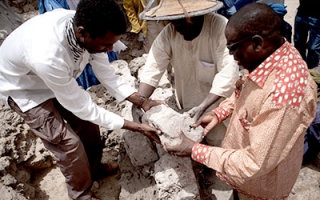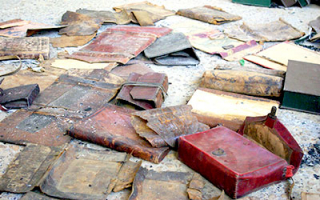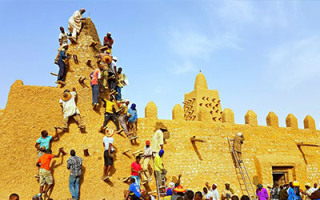Organizers:
UNESCO (United Nations Educational, Scientific and Cultural Organization)
ICCROM (International Centre for the Study of the Preservation and Restoration of Cultural Property)
OVERVIEW
Culture is a vital resource. Whether it's the rescue of the ancient manuscripts in besieged Timbuktu or the careful salvage of destroyed temples in the earthquake that struck the Kathmandu Valley, affected communities will always strive to protect their cultural heritage following an emergency.
Where does one start? Who can help affected communities in recovering their heritage? Questions such as how and when to intervene in an unfolding humanitarian crisis continue to be problematic for national agencies, tasked with both humanitarian relief and at-scale recovery of cultural heritage.
THE TRAINING
First Aid for Cultural Heritage in Times of Crisis (FAC) emphasizes coordinated emergency preparedness and response for tangible and intangible cultural heritage. It is based on a field-tested three-step framework for providing first aid to cultural heritage which can be adapted to any emergency context, whether conflict or disaster. It is especially useful in planning at-scale responses for securing and stabilizing different types of cultural heritage during complex emergency situations.
Developing a culture of preparedness, ongoing risk management, collaboration and coordination with mainstream emergency actors forms a core component of the training. Also identified are areas of joint programming between culture and humanitarian sectors to ensure that affected communities participate in their own recovery.
The training is mostly hands-on, aiming to enhance participants’ skills for emergency management, crisis communication, and providing people-centred first aid for cultural heritage. Using the recent conflict in Mali as a central case study, this course will offer insights gained in recovering cultural heritage in tandem with humanitarian recovery. Participants will gain first-hand experience of interacting with communities engaged in recovery, reconstruction and peace building processes. The rich cultural and social context of Mali will provide participants with a unique opportunity to understand the complex, longstanding links between people and heritage during crises.
EXPECTED OUTCOMES
At the end of the training, participants will be able to:
- Take action to develop coordination mechanisms between local cultural heritage institutions and agencies in charge of managing emergencies;
- Analyse a given emergency situation, and identify actors as well as priorities for providing first aid for cultural heritage;
- Carry out on-site damage and risk assessments for cultural heritage in emergency situations;
- Secure, salvage and stabilize a variety of cultural materials and structures;
- Communicate successfully with the various emergency actors involved;
- Work in multi-disciplinary teams to provide first aid for cultural heritage;
- Improve emergency preparedness for cultural heritage in and beyond their respective institutions.
WHO SHOULD APPLY?
- Professionals from the fields of cultural heritage (movable, immovable, tangible and intangible);
- Professionals responsible for disaster risk management, crisis response and emergency management (military, civil defence or civil protection);
- Those who have prior experience of working in an emergency situation or are responsible for protecting cultural heritage from disasters are especially encouraged to apply. Previous experience and/or ability to train others is desirable.
Maximum intake: 24 course participants, of which 19 are to be selected from African countries, including four from Mali, and five from countries outside Africa.
TRAINING TEAM
The multi-disciplinary and international training team will include professionals who have been working in emergency situations for protecting cultural heritage or who have experience in managing emergencies as well as facilitating rescue operations.
TRAVEL, ACCOMMODATION AND LIVING EXPENSES
Participants are responsible for their round-trip travel costs to and from Bamako, Mali, and for all living expenses. Tea and coffee breaks as well as lunches will be offered. To cover the cost of living, including accommodation, participants should plan for a minimum allowance of approximately 100 USD per day. Candidates are strongly encouraged to seek financial support from sources such as governmental institutions, employers and funding agencies.
FINANCIAL ASSISTANCE
UNESCO will offer up to 15 full scholarships covering round-trip travel, accommodation and meals during the course for professionals from African countries. Up to four participants from Mali are entitled to a partial scholarship to cover their travel to Bamako, local travel within Bamako, accommodation and meals. ICCROM will provide a limited number of scholarships to the selected candidates from outside Africa.
APPLICATION
In order to apply:
- Download the Application Form by clicking the button below, after filling it please send it by email to: FAC-AFRICA [at] iccrom [dot] org and epr [at] unesco [dot] org.
- Personal Statement: applicants are requested to provide a text of no more than 750 words explaining:
- Why you would like to participate in this course;
- How you intend to apply as well as disseminate knowledge and skills gained to improve first aid for cultural heritage locally;
- If applicable, please highlight your previous experience working in an emergency situation, and lessons learned



